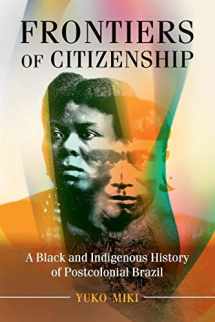
Frontiers of Citizenship: A Black and Indigenous History of Postcolonial Brazil (Afro-Latin America)
Book details
Summary
Description
Frontiers of Citizenship is an engagingly-written, innovative history of Brazil's black and indigenous people that redefines our understanding of slavery, citizenship, and the origins of Brazil's 'racial democracy'. Through groundbreaking archival research that brings the stories of slaves, Indians, and settlers to life, Yuko Miki challenges the widespread idea that Brazilian Indians 'disappeared' during the colonial era, paving the way for the birth of Latin America's largest black nation. Focusing on the postcolonial settlement of the Atlantic frontier and Rio de Janeiro, Miki argues that the exclusion and inequality of indigenous and African-descended people became embedded in the very construction of Brazil's remarkably inclusive nationhood. She demonstrates that to understand the full scope of central themes in Latin American history - race and national identity, unequal citizenship, popular politics, and slavery and abolition - one must engage the histories of both the African diaspora and the indigenous Americas.


We would LOVE it if you could help us and other readers by reviewing the book
Book review



